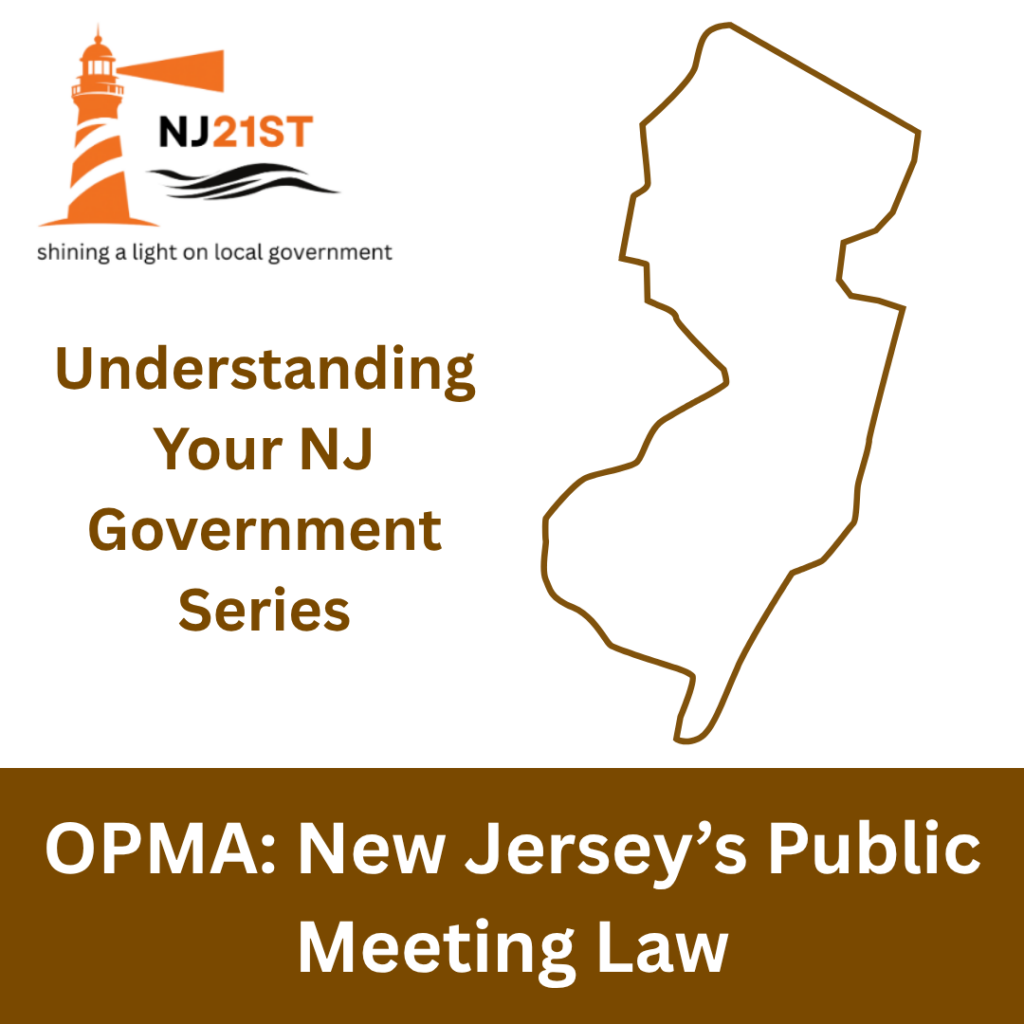[responsivevoice_button voice=”UK English Female” buttontext=”Listen to the Article Instead”]
The seventh article in an ongoing series intended to help NJ residents, especially students, understand their local and state government.
OPMA is one very important element of transparency in a tandem of laws intended to ensure New Jersey residents have access to how their government makes decisions. The law applies to Town Councils, Boards of Education, Planning Boards, County Commissioners, and every other public body. OPMA controls how these bodies conduct business so residents can observe the process.
When a government body violates OPMA it is acting illegally.
What Counts as a Public Meeting
A public meeting is any gathering of a quorum of a public body where public business is discussed or acted on.
A quorum is the minimum number of members who must be present for a public body to legally conduct business. Under OPMA, once a quorum is present, any discussion of public business becomes a public meeting and must follow all its requirements. The medium of conversation does not matter – in person, email, messaging group or even at a party or retreat – the second that minimum threshold is met, it becomes a public meeting and OPMA applies.
A good number of OPMA violations occur when officials believe or act as if a conversation is informal or off the record. OPMA does not care how a public official views it – it only cares whether public business is being discussed by enough members to constitute action.
Notices
A public body cannot hold a legal meeting unless it gives proper notice.
OPMA requires annual schedules posted at the start of the year and 48 hours’ notice for special meetings. Notices must meet the following conditions…
- Publication in two newspapers (getting phased out) or online official website (getting phased in)
- Posted in a public location
- Filed with the clerk
- Lists the date, time, location, and whether an executive session will be held
Notices posted at the last minute or hidden on a website are violations.
Agendas
Agendas must be available at least 48 hours before the meeting unless there is an actual emergency and need to contain enough detail for the public to understand what is being discussed or voted on.
Vague terms like “personnel”, “budget matters”, or “discussion items” aren’t enough when major action is being taken – a public body cannot vote on something that is not reasonably described in the agenda.
Nine Legal Reasons for a Closed Session
A public body may enter a closed session (Executive Session) only for reasons that are specific, narrow and listed in N.J.S.A. 10:4-12.
Anything outside those categories is illegal.
Before going into executive session the specific reason for the closed meeting must be disclosed to the public along with the discussion topics and when minutes will be made available to the public.
Here are the nine legal reasons:
- Items that the law defines as confidential – Student records, special education matters as an example. Again, the reasons must be confidential under the law- a Town Council or BOE member believing something should be confidential is not enough.
- Items that would create a barrier to federal funding – This is rarely used and connects to when a disclosure would risk federal compliance or grants.
- Individual Privacy – This exemption is narrow and only applies to highly personal information about identifiable individuals. It does not apply to general policy issues.
- Collective Bargaining – Union negotiations where public discussion would harm bargaining strategy.
- Real Estate – Purchase, sale, or lease of land where disclosure would harm the body’s negotiating position.
- Personnel / Terms of public employment – Hiring, firing, discipline, evaluation, promotion, or salary discussions of specific, identifiable employees. This exemption cannot be used for discussions about general staffing practices, curriculum, or instruction.
- Investigations or public safety tactics – Security procedures, emergency planning and ongoing investigations – it cannot be used for general policy disagreements like debating the efficacy and wisdom of police in schools.
- Pending or anticipated litigation – Applies only when litigation is active or clearly threatened and legal strategy must be discussed privately. It can’t be stretched to cover unrelated policy matters (like uncapped spending for police in schools).
- Civil Penalties – Usually connects to licensing Boards when deciding to suspend a license or impose a fine.
So Under OPMA Public Bodies Cannot…
- Cannot meet as a quorum without notice.
- Hold group chats, emails, or text chains to discuss public business.
- Use political caucus meetings in making binding decisions.
- Hold retreats or workshops without full notice.
- Enter closed session without stating the specific legal reason.
- Vote on matters not listed on the agenda.
- Keep closed session minutes sealed forever.
- Use personnel as a blanket excuse to hide public business.
These are not gray areas – they are violations.
How residents can enforce OPMA
Sending a written demand to the public body Identify the violation, cite the OPMA section, request correction and ask for release of closed session minutes if they were improperly withheld. Most bodies would fix the problem once they know someone is willing to escalate it.
Report violations to the County Prosecutor County Prosecutors have the authority to investigate OPMA violations – all it takes is a simple email describing the violation with screenshots of late notices, vague executive session motions, or evidence of quorum communication. Prosecutors are empowered to issue warnings or take formal action.
This is the simplest and fastest approach but not always effective- prosecutors seldom want to get involved. With that said..in 2021, myself and several residents reported the Berkeley Heights BOE to the Union County prosecutor for potential OPMA violations which led to a de facto settlement that included the BOE changing its policy on committee meetings.
Filing a civil action in Superior Court This is the strongest approach and involves asking the court to declare that a public body violated OPMA, nullify action taken at an illegal meeting, order the release of closed session minutes, issue an injunction requiring future compliance and award attorney fees. While anyone is allowed to file pro se most folks use an attorney because OPMA litigation is technical.
The law allows for fines under OPMA – $100 for the first offense, $100-$500 for subsequent offenses.
Quick Summary: New Jersey’s Open Public Meetings Act (OPMA)
Why OPMA matters
- OPMA is a core transparency law that lets residents see how public bodies make decisions.
- It applies to Town Councils, Boards of Education, Planning Boards, County Commissioners and other public bodies.
- When a public body violates OPMA, it is acting illegally.
What counts as a public meeting
- Any gathering of a quorum where public business is discussed or acted on is a public meeting.
- Once a quorum is present, OPMA applies in person, by email, in group chats, at parties, retreats or workshops.
- Informal or “off the record” does not matter. The law cares about the substance and the number of officials involved.
Notice and agenda rules
- Annual schedules and at least 48 hours notice are required for meetings, including special meetings.
- Notices must be published, posted, filed with the clerk and list date, time, location and whether there will be an executive session.
- Agendas must be available at least 48 hours before the meeting and be specific enough for the public to understand what will be discussed or voted on.
- Vague labels such as “personnel” or “budget matters” are not enough when major action is planned.
Closed session is tightly limited
- Executive sessions are allowed only for nine narrow reasons listed in N.J.S.A. 10:4-12.
- Examples include student and special education confidentiality, collective bargaining, real estate negotiations, specific personnel actions, security and active litigation.
- General policy debates, curriculum issues or broad “personnel” concerns cannot be pushed into closed session.
- Before going into closed session, the body must state the specific legal reason, topics for discussion and when minutes will be released.
Clear violations under OPMA
- Meeting as a quorum without proper notice.
- Using group emails, text chains or caucus meetings to conduct public business.
- Holding retreats or workshops without full notice and agendas.
- Entering executive session without a specific legal reason or voting on items not listed on the agenda.
- Keeping closed session minutes sealed indefinitely or hiding public business behind a generic “personnel” label.
How residents can enforce OPMA
- Write to the public body and identify the violation, cite OPMA, request correction and release of improperly withheld closed session minutes.
- Report to the County Prosecutor with a simple email and evidence such as late notices, vague motions or proof of quorum communication.
- File a civil action in Superior Court to ask a judge to invalidate illegal actions, order release of minutes, require future compliance and award attorney fees.
- Officials can be fined under OPMA. The law allows penalties of 100 dollars for a first offense and 100 to 500 dollars for later offenses.
See All Articles in the “Understanding Your NJ Government Series”
|



